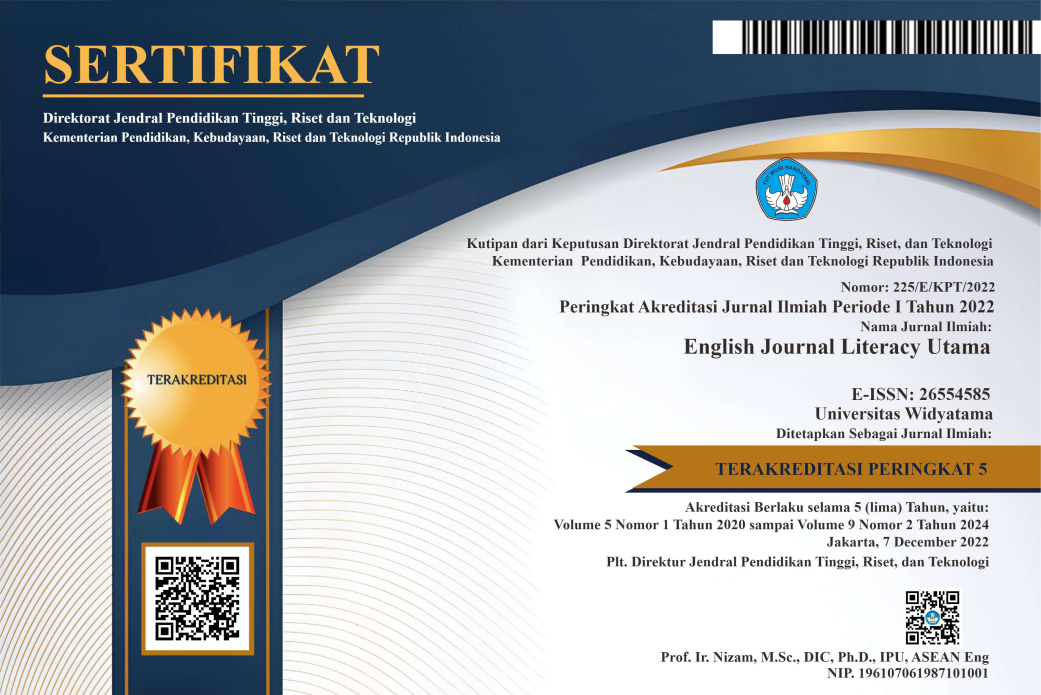Deixis in Kamala Harris's Acceptance Speech at the 2024 Democratic National Convention: A Pragmatic Study
DOI:
https://doi.org/10.33197/ejlutama.v9i1.282Keywords:
Pragmatics, deixis, types of deixis, meaning, speechAbstract
This research is entitled “Deixis in Kamala Harris’ Acceptance Speech at the 2024 Democratic National Convention: A Pragmatic Study.” The purpose of this research is to analyze the types of deixis and meanings used in Kamala Harris’ speech. In determining the theoretical framework, Levinson's theory is used to identify types of deixis, while Leech's theory is applied to analyze the meaning in the speech. The research employs a descriptive analytical method with the following steps: determining the research topic, collecting and studying relevant literature, formulating the problem, selecting data from the speech transcript, obtaining the data from CNBC Television’s YouTube channel, classifying and analyzing the data based on the types of deixis and meanings found in the speech, and drawing conclusions based on the analysis results.. From a total of 299 data points collected, further grouped into smaller units, totaling 40 data points. However, for the analysis in this study to be more specific, only 10 examples of deixis were selected. The findings reveal five types of deixis in the speech, namely personal deixis, temporal deixis, spatial deixis, social deixis, and discourse deixis, with the most dominant type being personal deixis, with the most frequently used type of deixis is person deixis. Additionally, seven types of meaning were identified in the speech, namely denotative meaning, connotative meaning, stylistic meaning, affective meaning, reflective meaning, collocative meaning, and thematic meaning, with connotative meaning being the most dominant. This research highlights how deixis and meanings play a crucial role in delivering effective communication within the context of political speeches.
References
Anderson, S. R., & Keenan, E. L. (1985). Deixis. In T. Shopen (Ed.), Language Tpology and Syntactic Description: Vol. 3. Grammatical Categories and the Lexicon (pp. 259–308). Cambridge University Press.
Brown, P., & Levinson, S. C. (1987). Politeness: Some Universals in Language Usage. Cambridge University Press.
Crystal, D. (2008). A Dictionary of Linguistics and Phonetics (6th ed.). Blackwell Publishing.
Griffin, E. (2006). A First Look at Communication Theory (6th ed.) in McGraw-Hill. Huang, Y. (2007). Pragmatics. Oxford University Press.
Kerlinger, F. N. (1973). Foundations of Behavioural Research. Holt, Rinehart, and Winston.
Kuo, C. Y. (2021). The Dynamics of Deixis in Verbal Communication: A Contextual Approach. Journal of Pragmatics, 180, 123–135.
Kuo, C. Y., & Tseng, W. C. (2020). The Role of Context in Interpreting Meaning in Communication. Journal of Pragmatics, 168, 100–112.
Leech, G. N. (1974). Semantics. Penguin Books.
Leech, G. N. (1983). Principle of Pragmatics. Longman.
Levinson, S. C. (1983). Pragmatics. Cambridge University Press.
Levinson, S. C. (2004). Deixis and Pragmatics. In L. R. Horn & G. Ward (Eds.), The handbook of pragmatics (pp. 97–121). Blackwell Publishing.
Lyons, J. (1995). Linguistic Semantics: An Introduction. Cambridge University Press.
Nadar, F. X. (2009). Pragmatik dan Penelitian Pragmatik. Jurnal Humaniora, 21(1), 88–99. https://doi.org/10.22146/jh.v21i1.766
Renkema, J. (2004). Introduction to Discourse Studies. John Benjamins Publishing.
Sweeney, S., & Ritchie, C. (2020). Meaning and Experience: A Phenomenological Perspective. Routledge.
Thomas, J. (1995). Meaning in Interaction: An Introduction to Pragmatics. Longman.
Vagle, M. D. (2020). Crafting Qualitative Research: Theoretical and Practical Perspectives. Routledge.
Van Dijk, T. A. (2021). Contextualizing Meaning in Discourse: A Socio-Cognitive Approach. Discourse Studies, 23(1), 5–22.
Wierzbicka, A. (1992). Semantics, Culture, and Cognition: Universal Human Concepts in Culture-Specific Configurations. Oxford University Press.
Yule, G. (1996). Pragmatics. Oxford University Press.
Zhan, M., & Zhang, J. (2021). Contextual Shifts in Meaning: A Socio-Pragmatic Perspective. Journal of Language and Social Psychology, 40(3), 367–382.
Zikmund, W., & Babin, B. J. (2010). Exploring Marketing Research. Cengage Learning.
Downloads
Published
Issue
Section
License
Copyright (c) 2025 Yoga Dwitama

This work is licensed under a Creative Commons Attribution-NonCommercial-ShareAlike 4.0 International License.
Creative Commons Attribution-ShareAlike 4.0 International License















